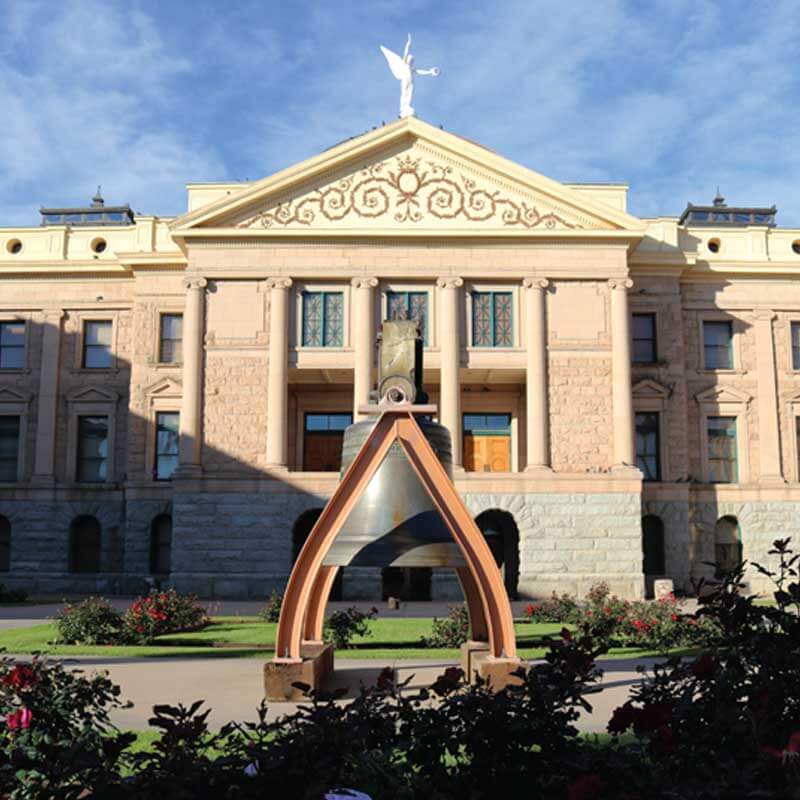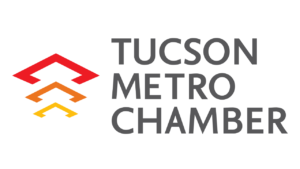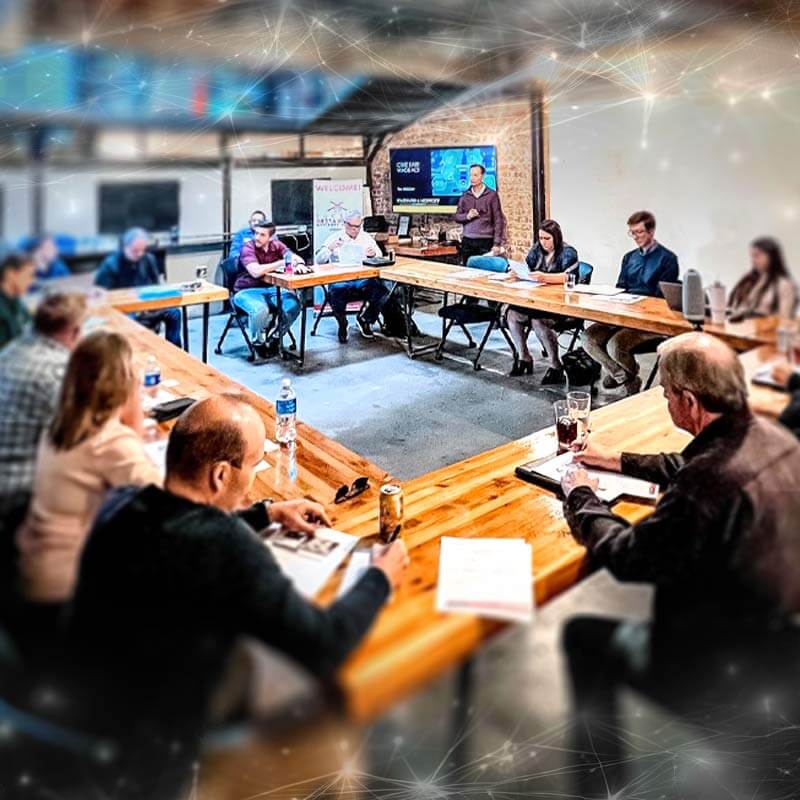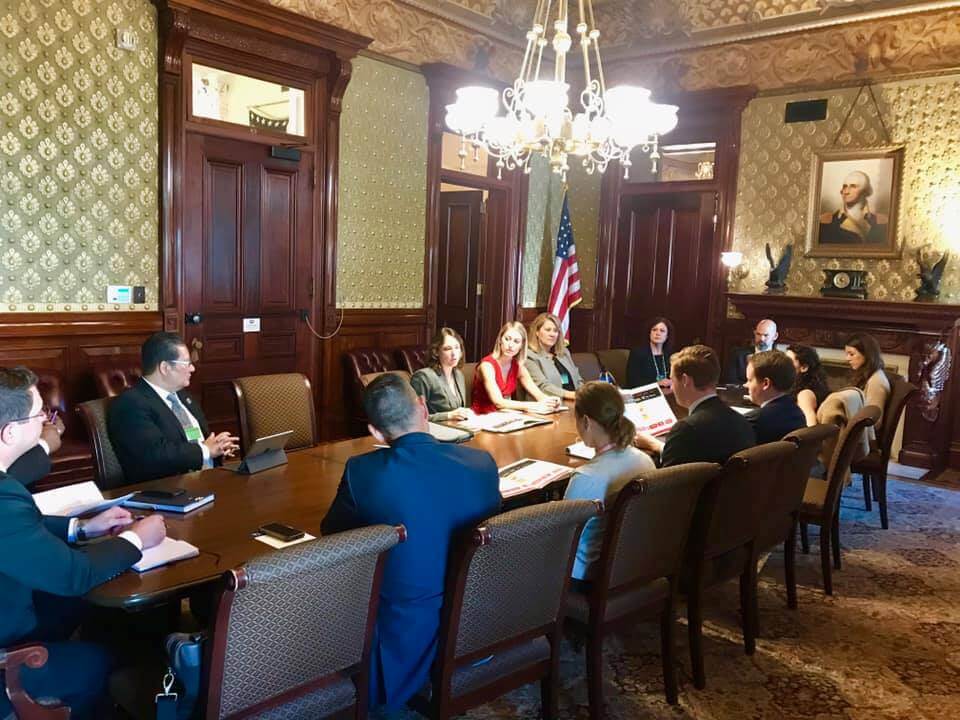SIGN IN
Local
Legislative Agenda
The Tucson Metro Chamber Business Advocacy team built this 2025 Public Policy Guide through extensive work with our Public Policy Council and an extensive listening tour with Chamber committees, coalitions, subject matter experts and member businesses and industries throughout Pima County. It is designed as an action plan to promote economic vitality within the region, with overarching Guiding Principles to respond to issues impacting business such as homelessness, housing, transportation and infrastructure, workforce development, crime and public safety and more. Additionally, the guide identifies Areas of Influence, offering a proactive work plan with key performance indicators to measure success in advocacy. This strategic approach makes the Guide a tool for Chamber and staff leadership to use to act with speed and substance in achieving our mission.
Economic Competitiveness & Innovation
Guiding Principles
-
Work with regional economic development organizations, educational institutions, and other partners to ensure prioritization of and improve on the five pillars of economic development: workforce and talent, quality of place, infrastructure, economic and business climate, and regional government and institutions.
-
Create an economic environment where entrepreneurs, small businesses, and large industries alike can thrive in order to have a range of wages and jobs that attract and retain talent across all sectors.
-
Focus economic development efforts and storytelling around anchor industries — mining, aerospace/defense, and biosciences/healthcare — as well as look at how the Chamber can be involved in the growing focus on advanced manufacturing technologies, supporting an environment for manufacturing in Southern Arizona while balancing the need for emerging, green-focused initiatives to ensure sustainability.
-
Strengthen Tucson’s reputation as a top destination by cultivating a thriving tourism industry. This involves backing local restaurants, hotels, and entertainment venues while promoting cultural, culinary, and recreational tourism in collaboration with Visit Tucson and other tourism partners.
-
Where appropriate, encourage public-private partnerships to expand economic development and growth in our community.
-
Support investment in capacity expansions for service infrastructure to overcome a disadvantage and increase our competitiveness compared to other cities: energy, communications, water, sewer, transportation, etc.
-
Advocate for proactive recognition and inclusion of locally owned businesses and landowners in early discussions of government practices or laws that will impact business operations and profitability.
-
Advocate for safeguarding the operations of local military installations in policy development.
Areas of Influence
-
Monitor and respond to legislative and regulatory changes, including Pima County’s adoption of the latest Food and Drug Administration Food Code, ensuring countywide compliance without imposing undue burdens on Tucson’s restaurant industry or other sectors.
-
Work with fellow stakeholders to ensure broader access to large-scale capital in the region for investing in startups and technology.
-
Monitor, assess, and report on key performance indicators of the city and county economic development teams including but not limited to new business permits issued, new businesses created, workforce participation, key wage measures, and new hires created within the anchor industries.
-
Expand relationships with the U.S.-Mexico Chamber of Commerce, Sonoran Corridor affiliates, and the manufacturing community to capitalize on the increase of trade flows and economic growth.
-
Coordinate with public and private stakeholders to ensure shovel-ready land for industrial development and manufacturing, and partner with economic development groups as applicable to promote to site selectors the opportunities available in the region.
-
Continue to advocate for the city and county to process development service permits in a timely manner, ensuring that delays do not hinder economic growth or deter potential investors from pursuing opportunities in the region.
-
Collaborate with educational institutions, vocational training centers, and industry partners to develop and expand workforce development programs. These programs should focus on upskilling workers to meet the demands of emerging industries, particularly in technology, the green economy, and advanced manufacturing. Ensuring a well-prepared workforce is crucial for maintaining economic competitiveness.
-
Collaborate with public and nonprofit organizations focused on increasing affordable housing.
-
Influence and support incentives and zoning that increase the supply of income-aligned housing across the spectrum of affordability.
-
Promote and educate decision-makers on the public services supported by primary and secondary property taxes and transaction privilege taxes generated through increased economic development.
-
Oppose regulations that obligate private landowners and current and
Land Use, Transportation, & Infrastructure
Guiding Principles
-
Advocate for efficient and effective land use.
-
Expedite entitlement processes and approvals of development services applications.
-
Actively promote the inclusion of provisions that advance our competitive advantage.
-
Promote reliable regional infrastructure, coordinated and expanded across local jurisdictions, as an essential government function that is necessary to preserving and improving economic growth and quality of life.
-
Support infrastructure financing focused on the use of broad-base funding sources as well as long-term funding solutions, with local businesses paying only their equitable and proportionate share.
-
Promote measures that provide practical and meaningful incentives for business investment in infrastructure and land use.
-
Expect jurisdictional plans, transportation improvements and infrastructure, and budgets to acknowledge the importance of future growth and allocate investments, particularly on vacant state lands, to sites that are the most likely locations for primary-jobs employers.
-
Support infrastructure investment uses of the speculative builder tax; the construction sales tax; and the maintenance, repair, replacement, or alteration tax.
-
Support initiatives and efforts that work to solve the digital divide and the digital inequities that exist throughout our region.
Oppose government-controlled or -funded initiatives that compete with the private sector, including broadband networks.
Areas of Influence
-
Advocate for changes in parking codes to ease the permitting burden on businesses.
-
Monitor the city of Tucson’s Community Corridors Tool as innovative zoning to spur smart growth, density, and transportation and provide support, given that it benefits and supports business growth.
-
Monitor, review, and analyze initial construction and ongoing operation and maintenance cost and benefit impacts to business, as resolutions, regulations, and ordinances arise in transportation, energy, water, and communications.
-
Quantify and educate elected unlimited mobile data government staff on the contributions of private, for-profit businesses to government public service delivery.
-
Advocate for the alignment of land development standards applied to both state and private land.
-
Monitor new license agreements with broadband providers to ensure a level playing field for all providers, including but not limited to waived right-of-way access fees, expedited permitting timelines, waived or decreased permitting fees, special construction standards, and other special treatment.
-
Ensure that the RTA (Regional Transportation Authority) Next initiative benefits urban, suburban, and rural land use for business, including where current populations reside and where growth is planned over the next 20 years. Given that, strongly support and lead on RTA reauthorization.
-
Advocate for a sustainable SunTran funding solution that closes the budget shortfall for Tucson’s fiscal year 2026, keeping it as affordable and as safe as possible while maintaining and expanding service as needed.
-
Advocate for revisions to the city of Tucson’s electric vehicle ordinance to ensure greater use of charging stations via expansion of public-private partnerships, strategic incentives, and focused optimization of locations.
-
Ensure the impacts of fee and rate increases, such as those for transportation, parks, and public safety impact fees as well as development fees assessed for Planning and Development Services, Park Tucson, etc., do not disproportionately or inappropriately impact businesses.
-
Advocate for fiscal impact analysis of regulations.
-
Support incorporation efforts to encourage regional allocations of state-shared revenue and inclusion of under-represented communities in regional planning discussions and decisions.
-
Monitor updates to the Utility Construction Manual and other manuals administratively drafted and adopted that interpret local ordinances.
-
Encourage and support coordination among local governments in the region as they pursue grant funding from the Bipartisan Infrastructure Law.
-
Work with local state legislators to prevent sweeps of the Highway User Revenue Fund to balance the state budget.
-
Advocate for zoning that protects Tucson International Airport, and the area around it, as an economic driver.
-
Engage with Pima County Regional Flood Control District on the NOAA Atlas 14 Precipitation Modelling and advocate to reduce negative impacts to existing businesses and employers as well as future land uses.
Energy, Environment, & Water
Guiding Principles
-
Encourage the continuing need for diverse energy sources in economic development and municipal/regional planning.
-
Oppose new Scenic and Gateway Corridor designations that affect overhead utilities within the urban environment and expand the designation of Scenic and Gateway Routes within designated growth areas for future business and employers.
-
Support regional coordination and collaboration among jurisdictions and water providers for improving efficient water use and water conservation.
-
Advocate for the use of water across jurisdictional boundaries to support development activities that create jobs and improve the local economy.
-
Ensure that water providers have sufficient volumes of water allocated to meet current and future economic development needs.
-
Support efforts that augment infrastructure delivery and management systems needed for community development and growth: supply, treatment, conveyance, generation, storage, maintenance, and upgrades.
Areas of Influence
-
Ensure the impacts of fee and rate increases, such as for Planning and Development Services, commercial water rates, Park Tucson, etc., do not disproportionately or inappropriately impact businesses.
-
Monitor intergovernmental agreements between the city of Tucson and Pima County to ensure responsible outsourcing of services and regular evaluations for continued efficacy.
-
Remain active and engaged on power and energy infrastructure issues, such as the Midtown Reliability Project and other such initiatives, to ensure both public and private benefit.
-
Promote a positive message about the Tucson region’s success in managing water resources and its sufficient water supply to meet future needs.
-
Continue support for the Tucson Regional Water Coalition and Pima County representatives on the Central Arizona Water Conservation District (CAWCD) Board
-
Support statewide efforts to ensure that future water re-allocations provide for current and future business needs.
-
Support Arizona’s and CAWCD’s efforts in the 2026 Colorado River re-consultation to ensure fair and equitable distribution of Colorado River water reductions among the seven Basin states.
Crime & Public Safety
Guiding Principles
-
Advocate for effective levels of funding for patrol officers within the Tucson Police Department and Pima County Sheriff’s Department.
-
Advocate for effective levels of funding for the Tucson Fire Department and regional fire districts.
-
Advocate for a data-driven approach that will result in appropriate and responsible staffing levels and response times according to our region’s population and geographic location.
-
Support policing reforms that address the appropriate level of force and the continuation of team efforts within the department that include proper training for mental-health and drug-treatment situations.
-
Support modifications to how emergency/911/dispatch calls are managed to ensure the most effective personnel response to the scene of the accident, crime, or situation.
-
Empower business owners with information on safeguarding their businesses.
-
Enhance the prosecutorial process for holding offenders accountable, and influence meaningful policy adjustments.
Areas of Influence
-
Work with retailers and partner organizations to report losses, publish local data, and leverage it for lobbying efforts.
-
Advocate for safer, more secure transit in Tucson and for the financial viability of the public transit system.
-
Assist law enforcement in coordinating across jurisdictions to address retail theft more effectively by strengthening communication and the consistency of reporting and data.
-
Engage in the hiring and oversight processes of government employees or elected officials, such as Pima County’s retail theft attorney, city court judges, etc.
-
Ensure that the Outdoor Lighting Code, and any changes to it, factor in issues related to crime and safety.
-
Explore and pursue with local partners the ability of Title 36 amendments to allow for involuntary treatment and rehab to address the mental health and substance abuse crisis that is driving long-term, unsheltered homelessness and its impacts on business and community.
-
Pursue opportunities with local jurisdictions to create/amend and enforce urban camping ordinances per the U.S. Supreme Court decision on Grants Pass v. Johnson.
Regulatory Policy & Taxation
Guiding Principles
-
Oppose regulations and policies that ignore the feasibility of affected industries to comply (ex., supply chain).
-
Expedite inspections.
-
Oppose regulations and mandates that increase material and labor costs, impact housing affordability and overall development, and put our region at a competitive disadvantage in recruiting primary jobs.
-
Advocate for policies that promote increased regional and national competitive advantage.
-
Prioritize incentive-based compliance programs.
-
Support efforts that accelerate and modernize permitting processes, including procedures and tools that reduce the aggregate time required to conduct reviews and make permitting decisions, advocating for regional consistency of these processes within and among jurisdictions.
-
Ensure that impact fee policies and development fee structures are based on state statutes and are fair and reasonable to the fee-payer.
-
Ensure that political subdivisions hold a public hearing before placing additional taxes on the ballot in each jurisdiction.
Areas of Influence
-
Work to fill boards and commissions with business representatives.
-
Advocate for full funding and staffing for the city of Tucson’s and Pima County’s planning and development services departments (PDSDs), in ways that do not burden business, based on demonstrated success in improving or meeting industry expectations for time and service delivery.
-
Continue to work with PDSDs on improving the speed of service delivery, including support and accountability around the Express, Fast, and Standard lanes and timelines set by PDSD leadership.
-
Advocate for the continued use and expansion of flexible lot development, adaptive reuse, Central Business Districts, Infill Incentive
-
Districts, and other programs and zoning that promote land development, business development, and economic development.
-
Monitor Plan Tucson, Pima Prospers, and Tucson Resilient Together plan development and execution to ensure they align with these Guiding Principles.
-
Monitor and respond to legislative and regulatory changes to the 2024 International Building Codes that impact land development, new construction, renovations, and adaptive reuse of existing buildings.
-
Engage in the development of the Resilient Southwest Building Code Collaborative project to ensure that climate resiliency priorities are balanced with business needs and affordable housing goals.
-
Assess the economic competitiveness and community need of the city of Tucson’s half-cent March 2025 sales tax proposal and advocate appropriately.
Homelessness
Guiding Principles
-
Advocate for rapid expansion of temporary and emergency shelters to provide immediate relief while transitioning toward long-term housing solutions.
-
Ensure that mental-health and substance-abuse treatment is available for all who need it. For those who are not able to chart their own care plan, explore court-appointed accountability measures.
-
Support measures that increase the availability of housing that is affordable for individuals transitioning from homelessness to stable housing.
-
Provide pathways for workforce integration or job training and other necessary support services needed to increase sustainable independence.
-
Support data-driven solutions that have shared metrics of success where the public and private sectors collaborate effectively.
Areas of Influence
-
Collaborate with the city of Tucson to implement an urban camping ordinance that defines appropriate camping locations within the city and enforces reasonable penalties for violations.
-
Work with the city of Tucson to adopt the “Say No to Panhandling” effort that Pima County has already completed, encouraging alternate support solutions in accordance with the above.
-
Work with the city of Tucson and Pima County to expedite zoning and innovations that can more quickly provide for a greater diversity of temporary and emergency shelters.
-
Advocate in areas where addressing the homelessness crisis intersects with crime and public safety (see “Crime & Public Safety” section).
-
Advocate for the adoption of data-driven, coordinated tactics with real-time collaboration to address the complexities of homelessness more effectively.
Workforce & Education
Guiding Principles
-
Focus the Chamber’s workforce development efforts on Tucson’s anchor industries, such as aerospace, defense, and space exploration; manufacturing (on-shoring/near-shoring business partnerships); construction; mining; and health sciences.
-
Advocate for the value of workforce training in the construction trades at all skill levels.
Aim to understand the workforce needed for the next 5 to 10 years. -
Support efforts that highlight career opportunities in the region to attract and train talent in critical industries.
-
Advocate for policies that increase access and reduce barriers in our community to participate in the workforce training and development pipeline and in full employment.
-
Support wrap-around services for workforce development efforts.
-
Explore opportunities for Chamber engagement in the expanding green technology sector in Southern Arizona.
Areas of Influence
-
Work with anchor industry leaders and education partners to develop the technical and research talent needed, with an emphasis on youth.
-
Work through the Chamber’s existing industry roundtables to bring manufacturing and construction opportunities to schools to influence local curriculums, provide real-world manufacturing experience, and engage with local public sector stakeholders.
-
Engage with local businesses to assist with workshops and resource fairs on work visa processing to engage a larger workforce population.
-
Engage in policies that support workforce development wrap-around services, including:
-
availability of affordable housing across the spectrum, including affordable, workforce, and market-rate housing. Emphasize a balanced
-
approach that avoids unnecessary or counterproductive regulations, such as rent control.
-
increased access to daycare, childcare, and quality early childhood education.
-
increased access to safe, reliable, and efficient transportation.
-
increased access to affordable healthcare.
-
Local Legislative Agenda
The Tucson Metro Chamber is your partner in facing some of the biggest challenges that impact business in our community. We give our members opportunities to become informed and make a difference in policy issues that support community growth.
Transportation
Our region’s ability to retain existing businesses and attract new employers depends on strong, interconnected systems, which includes a robust multimodal transportation network that provides for the efficient movement of people and goods.
Land Use
Guiding Principles
- Support the adoption and implementation of General Plans that include economic development strategies and encourage responsible development
- Support the simplification of rezoning, plan amendments and other entitlement processes that encourage infill development and company relocations and expansions
- Support land use planning that supports remote working
- Encourage jurisdictions to include land use planning as a component of their transportation planning efforts and programs
- Advocate for impact fee policies and fee structures that are based on state statutes and fund necessary public services
- Support increased density that is adjacent to employment centers to reduce the need for extensive transportation networks in the promotion of sustainable practices and models
- Support land use tools that encourage density and infill, such as Infill Incentive Districts
Areas of Influence
- Advocate relaxing parking requirements in support of an inter-connected multi-modal transportation system
- Participate in the City of Tucson’s General Plan stakeholder process
Public Safety
Public safety plays a critical role in supporting economic growth and vitality by reducing the cost of crime and enhancing the desirability of communities as places to live and locate businesses.
Guiding Principles
- Advocate for increased levels of funding for patrol officers within the Tucson Police Department and Pima County Sheriff’s Department
- Advocate for a data driven approach that will result in appropriate and responsible staffing levels and response times according to our region’s population and geographic location
- Support policing reforms that address the appropriate level of force and the continuation of team efforts within the department that include proper training for mental health and drug treatment situations
- Support changes to policing and prosecutorial practices to address the fentanyl and mental health crisis that is negatively impacting Tucson businesses
- Support actions from local jurisdictions that address homelessness
- Support modifications to how calls are managed to ensure the most effective personnel response to the scene of the accident, crime or situation
- Advocate for effective levels of funding for the Tucson Fire Department and Regional Fire Districts
- Support and advocate for investments in broadband infrastructure to increase our region’s telecommunications resiliency and preparedness for emergencies and natural disasters
Areas of Influence
- Continue to work with the Chamber’s Coalition Against Retail Theft and law enforcement partners to develop policy recommendations for the Pima County Attorney’s Office, City of Tucson Attorney’s Office and Tucson Police Department
Regulatory Climate
Guiding Principles
- Support and encourage the adoption of online permitting and other technology programs that will significantly reduce permitting turnaround times
- Support and encourage the consolidation of Development Services and Community Planning policies and procedures amongst the jurisdictions throughout the region
- Advocate for the consistency in industry standards by the County, City and Towns
- Oppose actions from the County, City and Towns that explicitly target potential and established businesses and industries in Tucson
- Work to fill boards and commissions with business representatives
- Work to gain the attention and respect that many neighborhood associations receive from the City of Tucson and elected officials
Areas of Influence
- Monitor allocation of American Rescue Plan Act funds by our local jurisdictions for residents and small businesses in priority areas and that those allocations are transparent and accountable
- Advocate for the continued use and expansion of Flexible Lot Development, Adaptive Reuse, Central Business District, and other programs that promote land development, business development and economic development
- Monitor the City of Tucson’s rollout of their new online permitting system to ensure that pain points are being resolved quickly and keeping up with the speed of business
Workforce Development
In order for our region to attract , retain and develop high quality employers, it is crucial to develop and promote a workforce that is prepared with the skills, knowledge and experiences necessary in the 21st century.
Guiding Principles
- The Greater Tucson Region should be considered a best practice for innovative industry specific workforce and educational strategies, including a system of high-quality Career and Technical Education aligned to the needs of the business community
- Support efforts to effectively highlight the career opportunities in the region to attract high-level talent in critical industries
Areas of Influence
- A collaborative of regional employers and stakeholders should fund and launch the Tucson Move IT Up Initiative
- In conjunction with the City of Tucson and Pima County, establish the Tucson Employer Development Program, an education and outreach program that provides resources, training and certification to the region’s employers
- The Greater Tucson Career Literacy Initiative should organize business and community leaders to bring information, connections and exposure related to high-quality careers into Pima County’s classrooms
- The Greater Tucson Workforce Collaborative should use an equitable approach to create an ecosystem that incorporates the right combination of wrap-around services and financial assistance that then allows every community member to access a good job with family wages resulting in a thriving economy
State
Legislative Agenda
The Tucson Metro Chamber has ensured that its statewide legislative priorities are integrated into the 2024 Arizona Chamber Executives State Legislative agenda. Leveraging regional partnerships with other Chambers in Arizona, the Chamber adheres to this agenda in statewide advocacy efforts, jointly advocating for business priorities across the state




